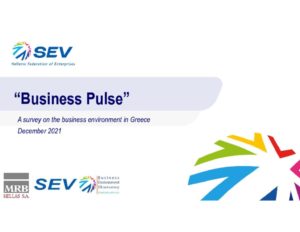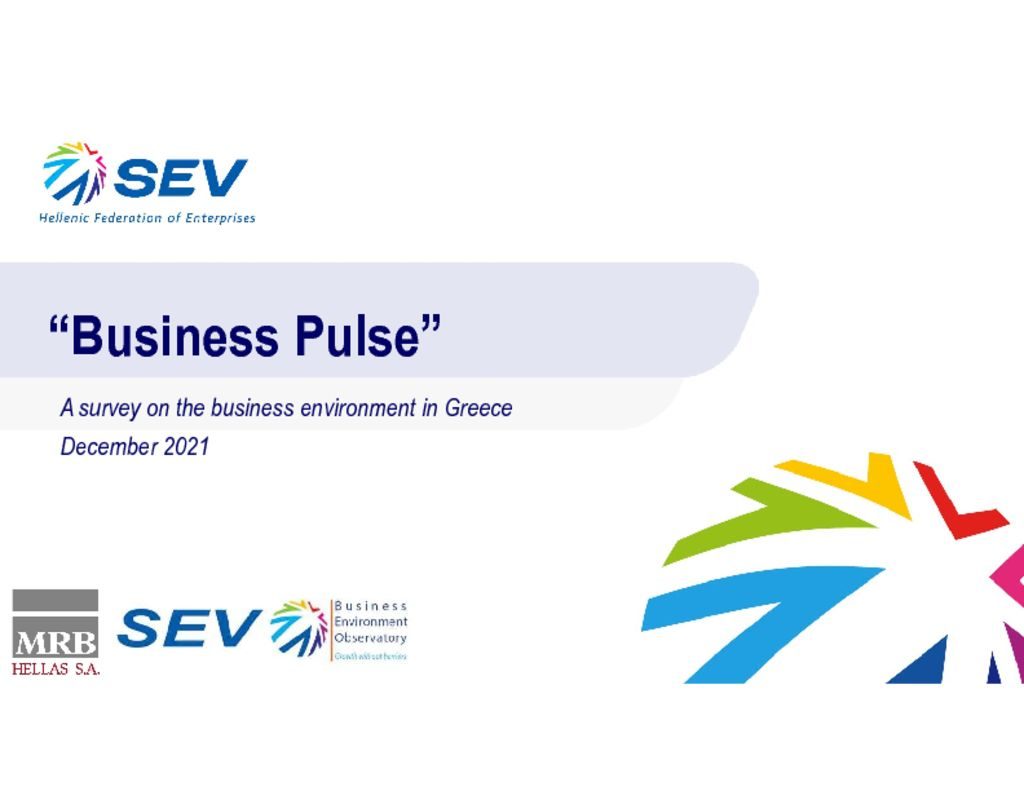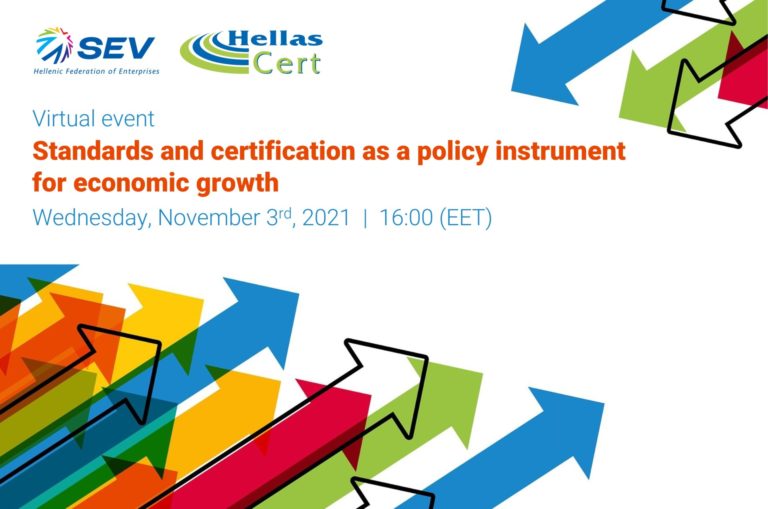
Business Environment
Promoting policies that create a business-friendly environment in Greece is pivotal for leveraging foreign and domestic, investments, and reinforcing the competitiveness of the Greek economy. SEV promotes policy proposals and ideas to reduce administrative burden, speed up B2G procedures, and enhance transparency in order to create a level playing field for all companies that operate in Greece.
- Setting up, operating, and closing a company: SEV consistently promotes the “digital by default” principle to create fast and simple electronic business-related services provided by GEMI, One Stop Shops and other public agencies. Our core priorities also aim to ensure the implementation of a value preservation-oriented insolvency and the 2nd chance framework to facilitate a true restart of viable companies.
- Corporate law and directors’ liabilities: We aim to assist in attempts for the modernization of the basic national corporate law framework and its functional relationship with the tax laws. Reducing red tape and unnecessary burdens in everyday business operations is crucial, as well as removing barriers to Mergers & Acquisitions, with a view to increasing flexibility, improving the investment environment, and encouraging dynamic companies’ growth. Our work also includes efforts to ensure that business executives acting in good faith are not disproportionally or unfairly burdened by liabilities.
- Investment licensing: A single and unified licensing system (building upon existing environmental licensing procedures) adequately supported by digital infrastructure and efficiently and aligned with policies and priorities related to spatial planning, including socio-economic and environmental policies. The simplification of licensing procedures is increasingly salient in order to overcome the impact of the economic and pandemic crises. Fostering investments through cooperation between interdependent actors with different, and often competing interests requires constant evaluation of existing frameworks and periodical revisions at national, regional, and local levels.
- Market Surveillance, Quality Infrastructure and Accreditation: With the simplification of licensing procedures, the need for effective market surveillance is multiplied, in order to protect law abiding companies from unfair competition and to ensure a high standard of protection of public interests (including health and safety, consumer protection, environment, etc.). Further work is needed to increase audits and to utilise all available instruments. Outsourcing can significantly complement the limited resources of the public sector. An upgraded quality infrastructure and accreditation system is also required, for the circulation of safe and high-quality products and services and for supporting public administration efforts.
- Spatial Planning, Infrastructure Networks & Coastline Affairs: SEV supports decisive progress towards a mature spatial planning system that ensures the existing companies’ ability to modernize and expand also through tangible incentives for choosing to locate in organized business parks vested with legal certainty and equipped with high quality infrastructure. Greece’s geography shapes the distribution of economic activities, with high concentration in urban regions and SEV supports improved spatial planning tools in order to develop integrated perspectives at the regional level and align plans with national growth priorities (green transition, sustainable and resilience productive activities, climate change, circular economy, etc.). SEV will continue to strive for the completion of spatial and urban planning, and the creation of an online digital platform containing all necessary information on land use, building coefficients, environmental or archeological limitations and constraints (NATURA, etc.). An adequate framework for economic activities in offshore and coastal areas (private-industrial ports, shoreline manufacturing activities, aquaculture, renewable energy, fisheries, oil/gas exploitation, tourism, etc.) through a pro-business maritime spatial planning and the designation of relevant sea uses, is also required.
- Business Parks: The establishment of business parks in areas where there is demand, should be straightforward and they should be supported with adequate infrastructure. Areas of business concentrations should be facilitated to morph into business parks with sufficient capacity to improve the management of the environmental impact of these concentrations. In addition, the viability of such parks is crucial while, at the same time, the terms of service offered to companies within business parks should ensure certain competitive advantages.
- Judicial system: SEV strives to increase the speed, predictability and transparency of judicial proceedings for the benefit of enterprises and citizens alike: by accelerating judicial proceedings a) by further developing e-services (online submission of court documents and tracking of court proceedings, full public access to Case Law, electronic notifications, etc.), b) by initiating the prosecutor assistant and the judge assistant and c) by promoting Court Alternative Dispute Resolution. SEV will continue to promote such ideas in order to increase predictability and transparency in order to achieve concrete results for both enterprises and citizens.
- Illicit trade: Illicit trade diverts opportunities from the legal economy, leads to significant losses of public revenue and skews competition, and there is an imperative need for legislative, institutional, and operational interventions. SEV actively supports coordinated actions towards the formulation of sound legal provisions and strategic policies. Mapping and understanding market vulnerabilities due to illicit trade is a key priority. We also monitor legislative developments, evaluate their implementation, identify good practices in Greece, and fully exploit SEV’s extensive international and European network.
- GDPR Implementation (since 2018) has created new challenges for Greek companies, especially with regard to ensuring compliance and addressing cybersecurity issues, in addition to legislative issues stemming from the transposition of the Directive, as well as the new set of guidelines and decisions on new infringement cases issued by the Hellenic Data Protection Authority (HDPA).
- Investment licensing reform: Significant reform efforts are under way which will change the investment licensing framework from an ex-ante licensing procedure, to an ex-post notification system (L. 4442/2016). SEV will continue to strive for further simplification of procedures through secondary legislation) and cooperate with the public administration to ensure that results are accomplished, and the reduction of administrative burden is evident. At the same time, we will continue to raise awareness among businesses about ongoing changes and their impact on day-to-day operations.
- Comprehensive planning policies to secure sustainable development of economic activity: Monitoring and evaluating ongoing procedures for the modernization of Sectoral, Regional and Urban Spatial Planning, and sector-specific proposals (manufacturing, mineral raw materials, infrastructure networks, etc.) in order to ensure the appropriate regulatory/planning provisions and prevent unnecessary restrictions on land use.
- Improving the setting up and development of renewable energy projects: Working towards Greece’s full legislative alignment on Renewable Energy Systems (e.g., offshore wind and hydrogen energy resources for industry) and promote the simplification of existing licensing legislation.
- Modernization of licensing procedures in Athens’ Metropolitan Area: Set up new regulatory provisions for the planning and licensing legislation for both the Attica Region and the greater Athens area.
- Foster growth and development of business parks, by strengthening competitive advantages (e.g. economic development incentives simplified environmental licensing procedures) and adaptation to international procedures (land acquisition, design and development, stakeholder engagement, infrastructure assessment and planning, resource and energy efficient park design).
- Digitization of geospatial data: Ensure the development of an Integrated Geospatial Data Mapping tool (Single Digital Map) to increase transparency for investors about land use rules and to reduce unpredictability in investment licensing decisions.
- Market Surveillance, Quality Infrastructure and Accreditation: In view of Regulation (EU) 2019/1020 and Law 4512/2018, companies and supervising bodies face numerous challenges for market surveillance. SEV monitors the implementation of the new legal framework and will supervise the implementation of outsourcing audits to the private sector. Also, SEV develops specific policy recommendations to upgrade the quality infrastructure and accreditation system of Greece.
- Illicit trade: Illicit trade is a threat to economic growth, sustainable development, social cohesion, security, and stability and endangers many sectors of the economy (including Tobacco, petroleum, coffee, food, alcohol). It feeds and maintains an illegal economy and results in lost revenue, market share and tax evasion, unfair competition, organized criminal activities and public health and safety hazards. SEV’s efforts centre on the creation and maintenance of a level playing field.
- GDPR: SEV closely monitors the regulatory framework, updates its members on best practices and international developments and engages in an active dialogue with the competent authorities regarding improvements in the national framework needed and clarifications that would promote compliance and understanding.
- Public Procurement: An efficient and transparent framework for public procurement is still needed, even as progress becomes evident (e.g. with the establishment of an efficient electronic PP platform). At stake is the elimination of opportunities for corruption, rationalization of fiscal expenditure, safeguarding fair competition, the encouragement of innovation and the use of public contracts towards digitalization and the achievement of climate change goals. SEV works closely with public authorities towards ensuring all necessary improvements.
- Spatial Planning Committee and Working Group and Coastline Issues subgroup: Join the Spatial Planning Committee and Working Group to participate in efforts to establish a predictable and business friendly framework of spatial planning and sustainable urban development.
- Business Parks Working Group: Business Parks can be catalysts of structural economic change, as they accelerate a country’s position in global value chains and foster positive spillovers throughout the economy. Join the Business Parks Working Group to contribute to the formulation of policy proposals and recommendations for business parks and improved services for participating companies.
- Βusiness Licensing Working Group & Renewable Energy Licensing subgroup: Join the group to help improve the licensing framework and its ability adapt to technological change.
- Market Surveillance Working Group: Join the group of business executives and experts to formulate policy proposals and recommendations to increase the effectiveness of market surveillance, as well as the accreditation and certification system. Special focus is given to the implementation of outsourcing to private sector to increase controls due to limited resources of the public sector, as well as to online market surveillance.
- Illicit Trade Working Group: Join the group and help improve our systematic efforts to combat illicit trade.
- Business Finance and Insolvency Framework Working Group: The new framework on business insolvency provides a powerful tool to support finance and growth. Join the Working Group to participate in developing proposals for further advances towards facilitating access to, and competitive terms of, finance.
- GDPR Working Group: Join our GDPR Working Group to help improve the understanding of the new framework, exchange best practices for compliance, and contribute to the formation of relative codes of conduct.
- Subject specific events: Stay up to date by participating in workshops, round tables, panel discussions and other subject specific events organized by our team on recent developments on competition and consumer law and practice.
- Be up to date: Follow our monthly Regulatory Affairs bulletin to acquire any latest news on competition and consumer framework and contribute by publishing your own expert opinion.
- Consultations: Participate in decision making through public consultations. Send us our comments, views and ideas on public consultations or other regulations and help us raise the voice of entrepreneurship in Greece.
- Business Pulse: Participate in our annual survey evaluating the business environment and help us to monitor the progress made, to highlight vulnerabilities and mostly to promote viable and realistic solutions to public administration. The survey comprises three parts: assessing the barriers to business environment, on both macro and micro level, evaluating the recent reforms and measuring public sector performance.
Related








